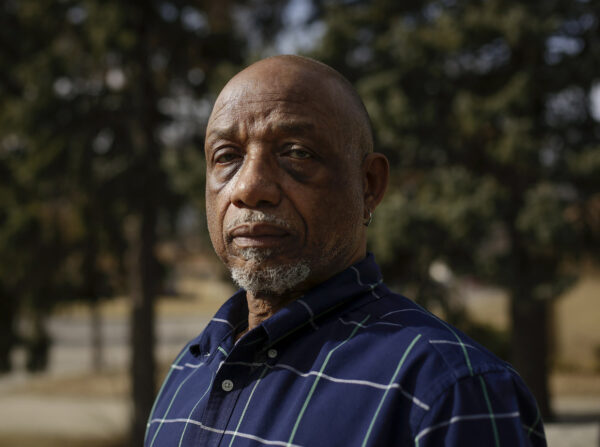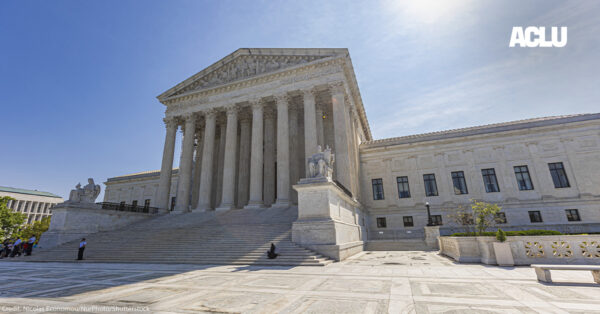Criminal Law Reform
Featured
Arizona
Oct 2023

Criminal Law Reform
Racial Justice
Fund for Empowerment v. Phoenix, City of
Fund for Empowerment is a challenge to the City of Phoenix’s practice of conducting sweeps of encampments without notice, issuing citations to unsheltered people for camping and sleeping on public property when they have no place else to go, and confiscating and destroying their property without notice or process.
U.S. Supreme Court
Sep 2023

Criminal Law Reform
McElrath v. Georgia
Does the Double Jeopardy Clause bar an appellate court from reviewing and setting aside a jury’s verdicts of acquittal on the ground that the verdict is inconsistent with the jury’s verdict on other charges?
U.S. Supreme Court
Jun 2023

Criminal Law Reform
Pulsifer v. United States
This case involves the interpretation of a federal law that allows defendants to avoid mandatory minimum sentences for certain nonviolent drug crimes, allowing judges to impose sentences tailored to their individual circumstances.
Texas
Jul 2021

Criminal Law Reform
Prisoners' Rights
Sanchez et al v. Dallas County Sheriff et al
Decarceration has always been an emergency, a life and death proposition, but COVID-19 makes this effort intensely urgent. The ACLU has been working with our partners to litigate for the rights of those who are incarcerated and cannot protect themselves because of the policies of the institutions in which they are jailed.
All Cases
133 Criminal Law Reform Cases

Maryland Supreme Court
Dec 2024
Criminal Law Reform
Roland Branch v. State of Maryland
This petition to the Supreme Court of Maryland asked the court to reconsider its adherence to Whren v. U.S., 517 U.S. 806 (1996), which declared that a traffic stop undertaken for pretextual reasons does not violate the Fourth Amendment to the U.S. Constitution so long as the police have probable cause to believe that a traffic violation occurred. The ACLU, alongside the ACLU of Maryland, filed an amicus brief in support of the defendant’s petition, in which the ACLU argued that the court should take up the question of whether pretextual stops violate the Maryland Constitution. In September 2024, the Court denied the petition.
Explore case
Maryland Supreme Court
Dec 2024

Criminal Law Reform
Roland Branch v. State of Maryland
This petition to the Supreme Court of Maryland asked the court to reconsider its adherence to Whren v. U.S., 517 U.S. 806 (1996), which declared that a traffic stop undertaken for pretextual reasons does not violate the Fourth Amendment to the U.S. Constitution so long as the police have probable cause to believe that a traffic violation occurred. The ACLU, alongside the ACLU of Maryland, filed an amicus brief in support of the defendant’s petition, in which the ACLU argued that the court should take up the question of whether pretextual stops violate the Maryland Constitution. In September 2024, the Court denied the petition.

North Carolina Supreme Court
Dec 2024
Criminal Law Reform
State v. Wright
This case in the North Carolina Supreme Court involves the question of whether the police violated the U.S. Constitution when they searched the defendant, Mr. Wright’s, backpack even after he repeatedly said no to the search requests. The ACLU alongside the ACLU of North Carolina filed an amicus brief arguing that the search was unconstitutional because Mr. Wright’s eventual “consent” was the result of police coercion. Our brief urges the court to consider the totality of the circumstances that make one more susceptible to coercion, including race and poverty.
Explore case
North Carolina Supreme Court
Dec 2024

Criminal Law Reform
State v. Wright
This case in the North Carolina Supreme Court involves the question of whether the police violated the U.S. Constitution when they searched the defendant, Mr. Wright’s, backpack even after he repeatedly said no to the search requests. The ACLU alongside the ACLU of North Carolina filed an amicus brief arguing that the search was unconstitutional because Mr. Wright’s eventual “consent” was the result of police coercion. Our brief urges the court to consider the totality of the circumstances that make one more susceptible to coercion, including race and poverty.

Pennsylvania Supreme Court
Nov 2024
Criminal Law Reform
Commonwealth of Pennsylvania v. Shivers
This case in the Pennsylvania Supreme Court asks whether flight from the police in a high-crime area, without more, can justify an investigative stop. The ACLU’s State Supreme Court Initiative, alongside the ACLU of Pennsylvania, filed an amicus brief arguing that it does not. The brief argues that the Pennsylvania Constitution supports broader protections against investigative stops than those recognized under the U.S. Constitution, and that flight in high-crime areas is not inherently more suspicious than flight elsewhere.
Explore case
Pennsylvania Supreme Court
Nov 2024

Criminal Law Reform
Commonwealth of Pennsylvania v. Shivers
This case in the Pennsylvania Supreme Court asks whether flight from the police in a high-crime area, without more, can justify an investigative stop. The ACLU’s State Supreme Court Initiative, alongside the ACLU of Pennsylvania, filed an amicus brief arguing that it does not. The brief argues that the Pennsylvania Constitution supports broader protections against investigative stops than those recognized under the U.S. Constitution, and that flight in high-crime areas is not inherently more suspicious than flight elsewhere.

Wisconsin
Oct 2024
Criminal Law Reform
Racial Justice
Collins et al. v. The City of Milwaukee et al.
On February 21, 2017, the American Civil Liberties Union, the ACLU of Wisconsin, and the law firm of Covington & Burling LLP filed a class-action lawsuit against the City of Milwaukee in the U.S. District Court for the Eastern District of Wisconsin. This lawsuit challenged the Milwaukee Police Department’s unconstitutional stop-and-frisk program that targeted tens of thousands of people without reasonable suspicion of criminal activity, primarily driven by racial profiling.
Explore case
Wisconsin
Oct 2024

Criminal Law Reform
Racial Justice
Collins et al. v. The City of Milwaukee et al.
On February 21, 2017, the American Civil Liberties Union, the ACLU of Wisconsin, and the law firm of Covington & Burling LLP filed a class-action lawsuit against the City of Milwaukee in the U.S. District Court for the Eastern District of Wisconsin. This lawsuit challenged the Milwaukee Police Department’s unconstitutional stop-and-frisk program that targeted tens of thousands of people without reasonable suspicion of criminal activity, primarily driven by racial profiling.

U.S. Supreme Court
Sep 2024
Criminal Law Reform
Racial Justice
Carpenter v. United States
This case concerns the First Step Act of 2018, in which Congress made major reductions to the mandatory minimum sentences for certain federal drug and firearm offenses. These changes result in sentences many decades shorter than were required under the previous laws. The question in this case was whether people who were initially sentenced prior to enactment of the First Step Act, but whose sentences were vacated and remanded for resentencing after enactment of the law, can benefit from its major reductions in applicable mandatory minimums. For defendants like Mr. Carpenter, who was originally sentenced to a draconian 116 years in prison as a result of the pre-First Step Act mandatory minimums, applying the First Step Act can mean the difference between dying in prison and having the opportunity to eventually go free. Unfortunately, although there is a split among federal courts of appeals on this question, the Supreme Court denied cert in this case in February 2024.
Explore case
U.S. Supreme Court
Sep 2024

Criminal Law Reform
Racial Justice
Carpenter v. United States
This case concerns the First Step Act of 2018, in which Congress made major reductions to the mandatory minimum sentences for certain federal drug and firearm offenses. These changes result in sentences many decades shorter than were required under the previous laws. The question in this case was whether people who were initially sentenced prior to enactment of the First Step Act, but whose sentences were vacated and remanded for resentencing after enactment of the law, can benefit from its major reductions in applicable mandatory minimums. For defendants like Mr. Carpenter, who was originally sentenced to a draconian 116 years in prison as a result of the pre-First Step Act mandatory minimums, applying the First Step Act can mean the difference between dying in prison and having the opportunity to eventually go free. Unfortunately, although there is a split among federal courts of appeals on this question, the Supreme Court denied cert in this case in February 2024.
